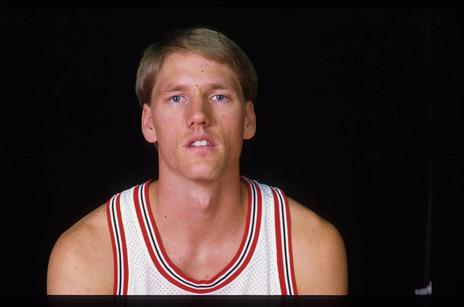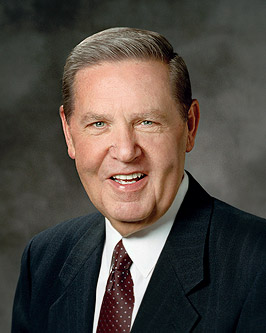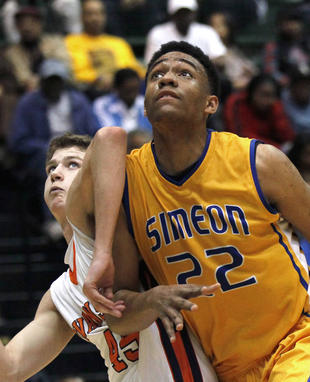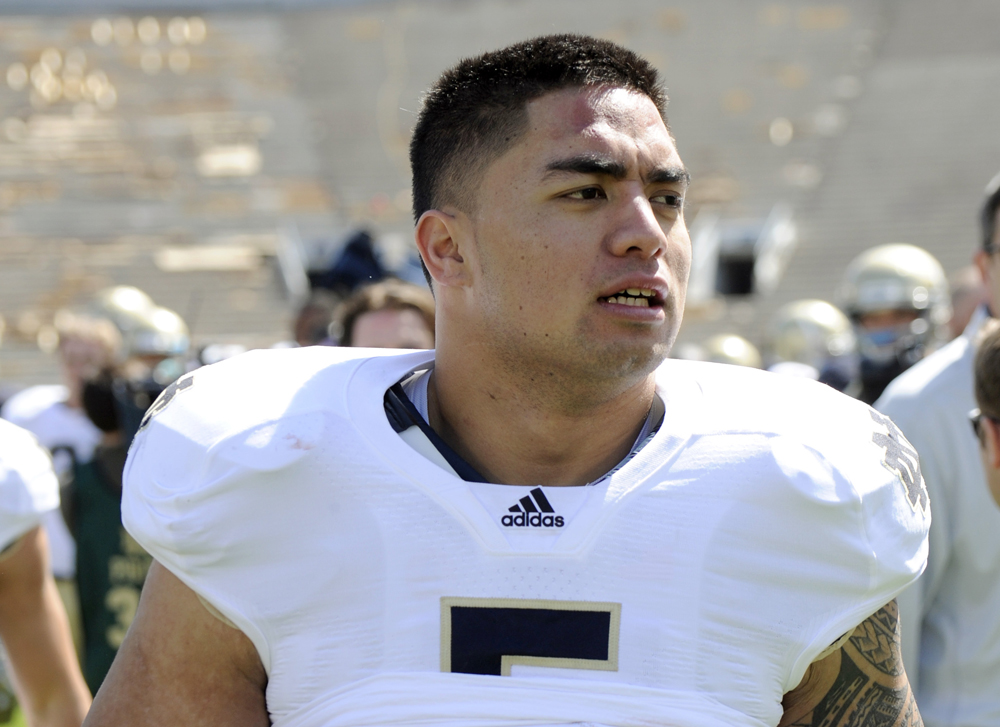 For starters, Smith had received an abundance of scholarship offers, and more than 50 college basketball coaches came to the Smith home to try and persuade him to play on the team for their respective schools. Next there was his religious convictions and lifestyle. The 6-foot-8 forward liked to party, swore like a sailor and hailed from a family that was openly hostile toward Latter-day Saints (commonly referred to as Mormons) even though they did listen to one LDS basketball coach. Furthermore, Smith felt that his official visit to the campus of the University of Utah was “by far the most boring” of his four recruiting trips which also included UTEP, USC, and Washington State .
For starters, Smith had received an abundance of scholarship offers, and more than 50 college basketball coaches came to the Smith home to try and persuade him to play on the team for their respective schools. Next there was his religious convictions and lifestyle. The 6-foot-8 forward liked to party, swore like a sailor and hailed from a family that was openly hostile toward Latter-day Saints (commonly referred to as Mormons) even though they did listen to one LDS basketball coach. Furthermore, Smith felt that his official visit to the campus of the University of Utah was “by far the most boring” of his four recruiting trips which also included UTEP, USC, and Washington State .
However, looking back in retrospect, Smith realizes that all things happen in life for a reason, and coming to Utah turned out to be the first in a series of miracles on a decade-long journey that ultimately led to him becoming a member of The Church of Jesus Christ.
“I tell my kids that … it works out, even for the rough guys like me,” Smith said. “Not that I was a bad guy, but I was about as far away from being Mormon as you can get.” [1]
Smith grew up in Phoenix, Arizona where religion was a central part of his life as his parents raised him and his siblings as Christians, but at the same time, they were hard-core anti-Mormons who openly shunned any of their neighbors who were a part of the LDS faith. When missionaries would come to their home they would accept copies of The Book of Mormon and then later toss them in the trash. He and his family also attended seminars where they were taught anti-Mormon rhetoric. He says that his father still maintains files on “how to talk to Mormons.”
“I don’t know where it came from. … I don’t think my parents were bad people … but I had one prejudice growing up — Mormons,” Smith said. “We didn’t know why we hated them — we just did, and that’s how it was. I grew up persecuting them a bit.” [1]
Smith also grew up spending a lot of time focusing on the sport that he loved and excelled at – basketball. As a senior in high school he averaged 27 points and 14 rebounds while leading Alhambra High School to a state championship. One newspaper even recognized him as the Arizona State MVP, while another named him co-MVP with future NBA star Sean Elliott.
The Influence of University of Utah’s Coach Archibald
After his senior year of high school, Smith was in high demand among college recruiters. He recalls that 56 coaches came to his house seeking his sports abilities for their team. Among those who interviewed Smith were UTEP’s Don Haskins, Arizona’s Lute Olson and coaches from all the Pac-10 schools. BYU also attempted to recruit him, but when they called, Smith used some colorful language and hung up the telephone.
Enter coach Lynn Archibald who somehow managed to connect with the Smith family. At one particular point during a visit, Smith’s mother asked him to promise her that “If he does go to your school, you got to keep those Mormons away from him.” [1] Coach Archibald replied, “That’s going to be tough, because I am a Mormon.” [1] The Smiths could not believe that he was a Mormon because he was so polite and cordial. Smith felt that there was something particularly unique about Archibald. For one thing, he never once spoke negatively about the other programs even though they all claimed that he would soon be fired.
“I hated snow, I hated Mormons, but there was something different and genuine about this guy,” Smith said. “I came to Utah because of Archibald.” [1]
Dating and Marrying a Mormon Girl
During his freshman year in college, Smith was at a dance club when he met an attractive blonde named Cindy Kilpack whom he asked out. She was a Mormon. Their relationship got off to a rocky start and they kept breaking up. Kilpack was reluctant to date Smith because of his opposing standrads and religious views, but as the relationship began to flourish, she began to see a different side of him.
“He had a tough upbringing, a hard mentality for sports that made him so hard on the outside, but he was so tender and sweet on the inside that I knew there was a chance,” Cindy Smith said. “But I didn’t think it would take 10 years.” [1]
Smith’s friends attempted to warn him that Kilpack would leave him if he didn’t get baptized and become a member of the LDS faith. However, despite their well intended warnings, Smith decided to listen to his heart, and he and Kilpack were married at the end of his sophomore year. They asked 3rd Circuit Judge Paul Grant, the father of Utah teammate Josh Grant, to perform the wedding.
“We found the perfect guy to marry us. He was a judge and an LDS bishop,” Smith said. “We told my parents he was a judge and we told her parents he was a bishop.” [1]
Even though they were now husband and wife, there were still some changes of heart that needed to be made. Within days of their wedding, Smith went out with his buddies and came home intoxicated. Cindy responded by locking him out of their apartment. She had herself been raised in a broken home of divorced parents and alcoholism, and was determined that she did not want the same thing happening in this, her new family. Therefore, she enforced some strict rules that Smith quickly learned to respect.
Out of Small Miracles Come Great Changes
Smith wasn’t drafted, but tried out for the Phoenix Suns and was invited to veterans camp. He knew the Suns had a full roster and at 6-foot-8, 195 pounds, he seemed like a long shot to make it to the NBA. He weighed that option against a $40,000 offer from a team in Madrid, Spain. Having a wife and young daughter to support, he opted to go overseas.
As the Smiths were starting to adjust to their new life in Spain, a small miracle occurred. One day while playing a practice game against another Spanish team, Mitch recognized one of the opposing players as former BYU center Tom Gneiting. Seeing a familiar face in a foreign country helped him to tear down a wall that had once been a major barrier. The whole idea of hating BYU seemed to vanish, and the two soon became friends.
That was only the first wall to fall. Cindy had located an LDS branch and met the missionaries. Smith agreed to allow them into his home because he enjoyed their company and the opportunity to speak English. But, the invitation did not come without a catch.
“I wouldn’t let them proselyte,” he said. “But it got me used to hanging out with missionaries. They weren’t the devil after all.” [1]
Those two Mormon Elders would be the first in a string of about 60 different missionary companionship that visited the Smith home over the next several years. Cindy expressed that although they could not discuss the gospel, having the missionaries in their home provided a safe and peaceful presence, as well as, helped to combat homesickness.
“At that point, it didn’t matter that we weren’t having discussions yet — it was positive,” she said. “It bonded us together even though he (Mitch) didn’t realize it.” [1]
The Death of a Friend Brings Enlightenment

Elder Jeffrey R. Holland of the Quorum of the Twelve Apostles of The Church of Jesus Christ of Latter-day Saints spoke at the funeral services of Lynn Archibald, a mentor of Mitch Smith. Elder Holland would later perform the sealing ordinances for Mitch Smith and his family in the Bountiful Utah Temple, a year after Smith’s baptism.
By the end of his seventh season in Europe, Smith was named the MVP of his league and collected the most money he had earned to that point. Still, off the court, he had not changed his mind about The Church of Jesus Christ, but he had mellowed out about it considerably. All the while Cindy continued to attend services at a small LDS branch with their daughters.
In January 1997, he received a heartbreaking phone call from the United States, informing him that Archibald, his mentor and friend, was dying of cancer and his time was short. Smith was in the middle of a season and didn’t think he would see his old coach again. An opportunity to go home came two weeks later, however, when his team suddenly ran out of money.
“With no money, they take the car. The apartment’s not paid, the school’s not paid,” Smith said. “So I end up coming back and hanging out with ‘Arch’ for two months before he died.” [1]
Smith was considered a part of Archibald’s family and the time that the two of them were able to spend together were meaningful. Coach Archibald had never talked about the church before, but the subject came up in his final days. It was then that Smith realized the church standards and values were having a positive impact on his family, and suddenly he was OK with that.
“So I’d gone from fighting with the wife — ‘They (the girls) are going to be Baptist’ — to ‘I’m fine with them being baptized (in the LDS Church),’” Smith said. [1]
Archibald died on 28 May 1997. Smith was asked to speak at his funeral. It turned out to be a powerful spiritual experience for him and he said that he felt the Spirit as he spoke. Bob Burton, a friend and former assistant coach to Archibald, spoke next. Burton finished and sat next to Smith, and the two listened with great interest as the third speaker gave his remarks. The third speaker was Elder Jeffrey R. Holland, then a new member of the Quorum of the Twelve Apostles, who was there at the request of Elder Neal A. Maxwell, a close friend of Archibald who wasn’t able to attend due to an illness.
The Witness of the Spirit
The following year, Smith received a generous offer from a team in Belgium. As the family became settled in their new surroundings they also became acquainted with a new home teacher, an American lawyer, who Smith said was very assertive and told him that he was going to take the missionary discussions without ever giving him a vote on the matter. It then dawned on Smith that the reason that he was in Belgium was because there were no missionaries in Turkey, but there were in Belgium. He agreed to the missionary lessons, unbeknown to him that Cindy had called home and asked friends and family to fast and pray for her husband.
During the first visit, one of the Elders asked Smith’s daughter, then 8 or 9 years old, why she wanted her father to join the church. “So the family could be together forever,” she replied.
“Game, set, match,” Smith said. “I feel something and I know what the answer is, but I’m still hard-headed. I tell the missionaries the kids can’t be in any more discussions.” [1]
However, as the sessions continued, Smith wrestled with his feelings. He wasn’t sure if the gospel was true and he still wanted to indulge in drinking. When he did pray, he expected lightning-bolt answers. Then another miracle occurred. One night when Smith was up late holding his fussing baby daughter, he said a prayer and looked at a calendar. He had almost come to the conclusion that he would not have to join The Church of Jesus Christ of Latter-day Saints when his eyes suddenly settled on 13 June.
“I got that feeling, the one you don’t want to admit, especially someone stubborn like me,” Smith said. “There was no chance of denying what I felt.” [1]
When the family returned to the United States, Smith called the Bishop and requested a baptismal service for Saturday, 13 June 1998, which turned out to be the only weekend his parents could come from Arizona. They came despite their strong opposition to his decision, demonstrating what Mitch called “the true love of a parent.” Smith never wavered in the faith after getting baptized, his wife said. “He was all in,” Cindy Smith said. “It was exactly what he wanted to do.” [1]
The Story Continues. . . .
 Smith returned to Turkey the next season but wasn’t the same player. “I never figured out how to play after I was baptized,” Smith said. He had other offers, but his perspective had changed as his family was more important to him now. He and his family had been living in Europe for 10 years, and he deeply appreciated all the sacrifices that they had made in support of his career. Moreover, he could no longer play basketball with the same anger and intensity as he once had. He knew in his heart that his pro basketball career was over.
Smith returned to Turkey the next season but wasn’t the same player. “I never figured out how to play after I was baptized,” Smith said. He had other offers, but his perspective had changed as his family was more important to him now. He and his family had been living in Europe for 10 years, and he deeply appreciated all the sacrifices that they had made in support of his career. Moreover, he could no longer play basketball with the same anger and intensity as he once had. He knew in his heart that his pro basketball career was over.
A year after his baptism, the Smith family was sealed together in the Bountiful Utah Temple by Elder Jeffrey R. Holland, who didn’t know Mitch’s history, but who had followed his career at the University of Utah.
“That sealing was a very sweet experience, as sealings always are, but this was special because I had always thought so highly of Mitch,” Elder Holland said. “I’m an old basketball player of sorts myself, so I was very impressed by him when he played at the U. … I thought of him as just the kind of guy we always want at BYU. … I was proud to do it.” [1]
 After returning to the Salt Lake area, Smith spent nine years coaching the girls basketball team at Woods Cross High, including two daughters. Since 2010, he has worked as a salesman for Otis Elevators and currently serves as the Ward Mission Leader in his North Salt Lake Ward. As part of his missionary effort, he created a profile to share his story on Mormon.org. The Smith family has also performed the temple work for Mitch’s mother, who died a few years ago. [1]
After returning to the Salt Lake area, Smith spent nine years coaching the girls basketball team at Woods Cross High, including two daughters. Since 2010, he has worked as a salesman for Otis Elevators and currently serves as the Ward Mission Leader in his North Salt Lake Ward. As part of his missionary effort, he created a profile to share his story on Mormon.org. The Smith family has also performed the temple work for Mitch’s mother, who died a few years ago. [1]
Elder Holland said Smith’s story illustrates that Heavenly Father is the ultimate strategist because he puts people exactly where they need to be, when they need to be there, to accomplish his purposes. Smith’s story is also an example of the need for more understanding, compassion and determination in seeing the good in people, which leads to finding common ground and friendship. [1]
“There can be the tendency to jump to hasty judgments on both sides. This ought to be avoided,” Elder Holland said. “Mitch’s story is an example of patience, kindness and thoughtfulness, with basic courtesy and faith winning out in the end.” [1]
Additional Resources:
Mitch Smith’s Mormon.org Profile
Basic Mormon Believes and Real Mormons
The Lord Jesus Christ in Mormonism





